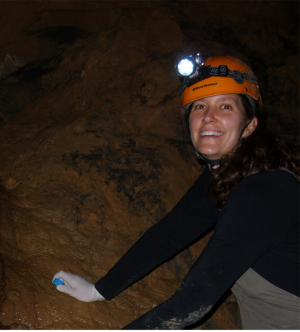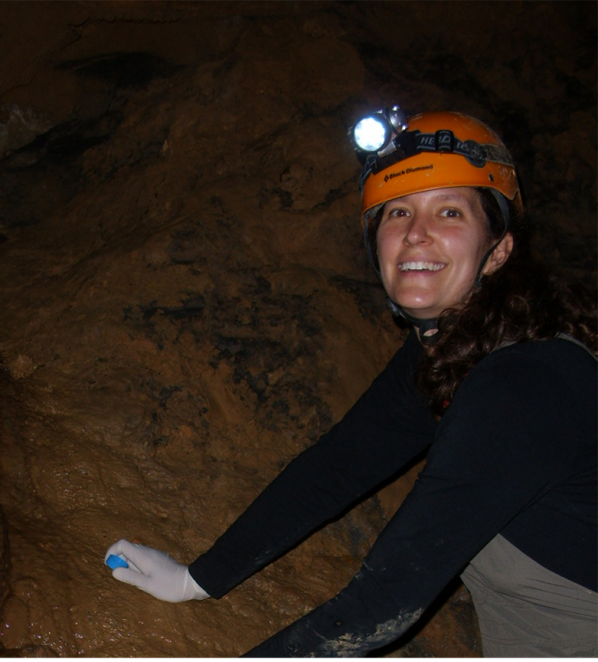Why did you become a Biologist (and specifically the type of biologist you are)?
As a child I always loved the outdoors and eagerly explored crawdads in the stream and a resident Great Horned owl that lived in a tree on our property. In junior high, I participated in the Science Olympiad. Our team won the state championship and competed in nationals. There I became the winner of the national tree identification, an accolade that also earned me the nickname, "tree."
When did you know this was your career choice (Discuss the process through which you ended up choosing this as a career.)?
When I was 13, I announced to my mom that I intended to get my PhD. When she replied that I would be the first in the family, it hardened my resolve. My passion for science led me to the North Carolina School of Science and Math, but it was my experience engaging students through national service with Americorps, that I decided to become a professor. In college, I gained a liberal arts education and focused on foreign language and chemistry. Because microbes are the true chemists of the world and shape our environment and our atmosphere, the field of Microbiology eventually "hooked" me and allowed me to combine my love of the outdoors with science.
Where are you originally from and how did your childhood influence your career decision?
I grew up in North Carolina and consider the foothills, where my parents currently reside (Morganton, NC), and mountain area my home. Both of my parents had medical careers, but I was always squeamish around blood and knew from a young age that was not the path for me. We had a microscope and I would spend hours collecting sediment, creek water, and pond scum and observing the movement of the microorganisms. I did not know at that time that I would end up as a microbiologist, but it certainly helped shape my decisions.
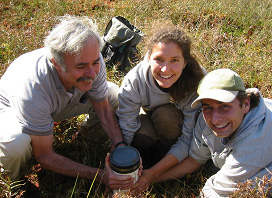 Who was was your inspiration?
Who was was your inspiration?
Members of my family have always been my inspiration: my mother was a strong and nurturing nurse, and later became a reading specialist and founded the Burke County Literacy Council; my father is a dedicated physician's assistant; my grandfather was a science teacher, basketball and wrestling coach and later supported educational bills through the NC House of Representatives; and my uncle is a successful freelance writer whose eloquence and mastery of language has always inspired and pushed me to strive for better writing.
If you had to do it again, what would you be?
Although I'm extremely happy with my job, I have many passions. I could have ended up in a number of careers, all very similar, if not nearly identical to my current position: chemistry, botany, environmental science or biochemistry professor, or outside of academia, potentially a nutritionist, clinical pharmacist, or culinary specialist.
What courses do you currently teach?
I currently teach Microbiology and a capstone course entitled, "Human and Global Microbial Diversity"
Are you planning to teach any new courses in the near future?
As a recent recipient of a Fulbright- Saastamoinen Foundation Award in Health and Environmental Sciences, I will be developing a course in biogeochemistry and will also be teaching a microbial diversity course at the University of Eastern Finland in Kuopio, Finland in the spring of 2015.
What do you like most about teaching?
I live for days when classroom discussions escalate, when students ask all the right questions, when a student becomes enlightened, or when a student takes me by surprise with a new idea. Although these days are relatively rare, there are several students that I've had in the past who have really inspired me- students who were extremely engaged and not afraid to challenge the current scientific knowledge. These types of educational and personal experiences have helped me to create a passion for life-long learning and it is my hope that my students will gradually obtain a similar passion. I have become committed to studying science and building a strong community that is versant in the sciences. As a teacher, I hope to inspire students to learn more about the natural world and to propel them into successful careers.
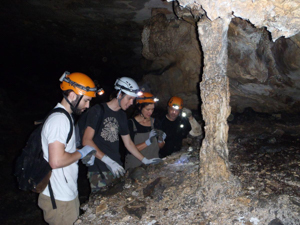 What is the overarching goal of your research program?
What is the overarching goal of your research program?
I am broadly interested in the ecology and diversity of microorganisms in various environments including coastal margins, wetlands/peat bogs, deep-sea hydrothermal vents, and caves; and I am interested in studying the impact of these microorganisms on the biogeochemical cycling of nutrients such as Fe, Mn and C in the environment. I am currently conducting research in two main areas: 1) Ecology of archaea in peat bogs and 2) Microbial biogeochemistry and ecology of caves.
The first project is relevant to global climate change because methanogenic archaea are the primary natural source of the greenhouse gas methane. Our main goal is to understand the factors driving the activity of these organisms.
The second project has had two main goals. 1) First, we have gained and hope to further develop a better understanding of the anthropogenic impacts of human waste (sewage and trash) on the water quality and microbial composition and activity in the caves. 2) Second, as part of a NASA-funded NC Space Grant, we have sought to understand the diversity of Mn oxide mineral structures and morphologies produced by a diversity of novel microorganisms, and which might be likely to be detected in different environments on Mars and/or other planets.
Can you give us a synopsis of your research projects?
In Carter Saltpeter Cave in Johnson City, TN, we have found that non-point source sewage has impacted the water quality and caused a dramatic change in the microbial community causing a massive bloom of a manganese-oxidizing biofilm. Because manganese oxides are a visible black-brown mineral, it may allow visual detection of exogenous carbon input in other caves as well. My current graduate student, Bryan Zorn has demonstrated that exogenous carbon input causes an increase in particular Mn-oxidizing fungi as well as opportunistic saprophytes such as Mortierella.
In local peatlands, we have found a surprisingly high diversity of archaea likely due to the high degree of spatial heterogeneity and somewhat higher pH of southern Appalachian peatlands. We plan to continue examining factors driving this diversity and the impact on overall methane production in southern Appalachian peatlands compared to their northern counterparts.
What are you most proud about in terms of the research you've been a part?
For the past three summers, I've had the opportunity to mentor some of the world's top graduate, postdoctoral and faculty researchers at the prestigious Microbial Diversity Course, now in its 42nd year, at the Marine Biological Laboratory in Woods Hole, MA. I have learned a tremendous amount and it's been a true pleasure. Additionally, as a graduate student, I took on a project that researchers had attempted unsuccessfully for 20 years prior: culturing an acidiphilic methanogen from peat. Largely due to the vast knowledge of my graduate advisor, Stephen Zinder, in microbial physiology, the project was successful and published in Nature in 2006.
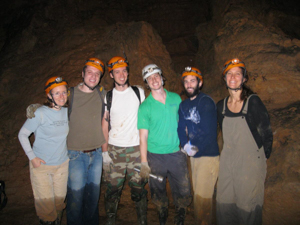 Do you have any interesting stories about the research you have been a part of?
Do you have any interesting stories about the research you have been a part of?
Because I study life at the extremes- deep sea hydrothermal vents, acidic peatlands, and underground caves, my research has taking me on all sorts of adventures. I have been on a three-week deep sea cruise off the coast of Hawaii with the remotely operated vehicle owned by Woods Hole Oceanographic Institute, "Jason," and I have led students into deep dark underground caves. Another one of my most memorable research ventures involved hammering 15 feet of PVC pipe into a peatbog, which took two professors and two graduate students all their might to retrieve it. Overall, my career is a source of constant excitement and adventure.
What do you like most about doing research?
I love the thrill of problem solving like putting together pieces of a puzzle, struggling for months or years with a difficult experiment only to awake with an "ah-ha" moment at 4 am one morning, or imagining an eloquent way to present it all while cross country skiing. The scientific quest is all-consuming and allows for great discovery and ideally, both improves our understanding of the world and propels solutions and inventions.
What advice do you have for undergraduates/graduates pursuing degrees in biology these days (or advice on how to be a successful student at App State?)
There are two pieces of advice that were really instrumental in my career. First, an undergraduate professor, Dr. Andrew Brabban advised me to choose my graduate program and advisor carefully. As he put it, "your graduate career lasts longer than most marriages, so you better make sure you get along well". Second, many young researchers do not realize how frequently most research endeavors fail. When I was really struggling as a postdoc, my former graduate advisor, Dr. Stephen Zinder recommended that I "throw a bunch of things against the wall and see what sticks." Not every idea will be successful, but it's important to be persistent and keep experimenting with many different approaches.
